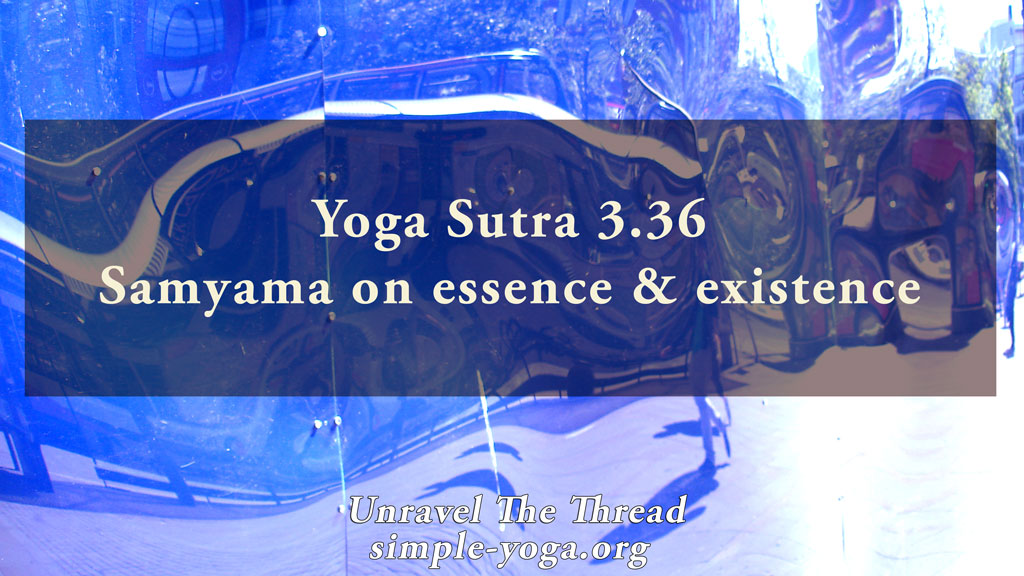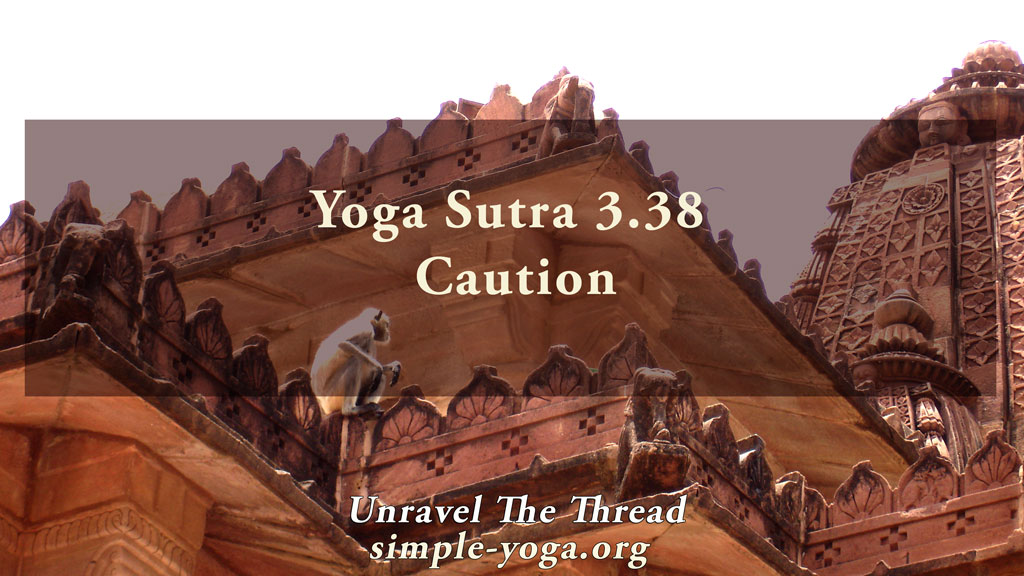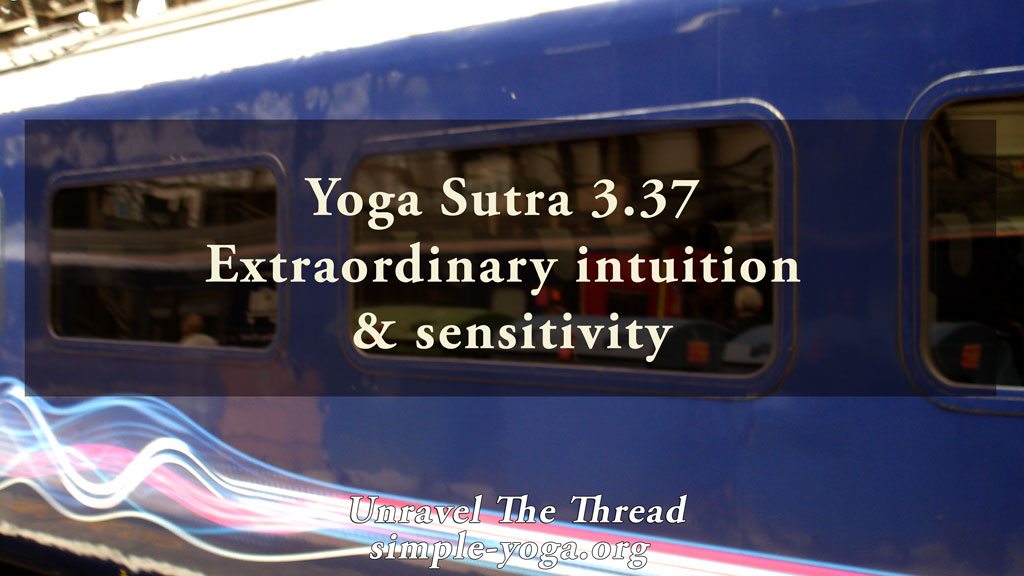
3.36 Samyama on difference essence and existence
January 4, 2022
3.38 Caution
January 18, 2022
3.36 Samyama on difference essence and existence
January 4, 2022
3.38 Caution
January 18, 20223.37 Extraordinary intuition and sensitivity

3.37 As a result, intuition and extraordinary sense perception unfold.
Knowing the difference between your individual awareness and universal awareness removes the confusion that prevents you from seeing yourself as you are. And, according to the previous sutra, being clear on that distinction enables you to know pure awareness. This aphorism adds that the intuitive insight (pratibha) mentioned in sutra 3.34 results from being established in that clarity. As you consider the idea of deep intuition, consider whether it is possible that wild animals use their intuition to gain access to the wisdom guiding them to migrate, hibernate, and estivate. Some perspectives look for an explanation of these and other natural phenomena in the material make up of life. Other viewpoints suggest that there are multiple levels of embedded information orchestrating those processes. For instance, when you go to sleep, if you are not sleep deprived, and you know that you need to wake up at a certain time, does it ever happen that you wake up at the time you need, often before your alarm goes off? Is it possible that when you set your intention to wake up at a certain time you are setting that intention somewhere in between your internal processes and pure awareness?
Is it possible that it is your intuitive insight that wakes you up at the right time?
Could it be that uncluttering your inner world from wants, cravings, opinions, and beliefs may bolster your ability to tap into the wisdom that makes all processes in nature work?
Is your individual awareness embedded in universal awareness?
In addition to gaining deep intuition, knowing pure awareness results in heightened sensory perception. Aphorism 1.35 already offers subtle sensations as a productive object for single-pointed focus. Adding awareness to any of your senses is a way to enhance your perception, so that instead of staying with the gross level of sensory perception you access a richer, deeper, and more nuanced understanding of whatever you are perceiving. When you really want to determine what spices were used in preparing a delicious dish, you focus your awareness by not talking, by closing your eyes and by attending to the specific sensations in your mouth. As a result, you are better able to notice textures, moisture, softness, granularity and a wide range of sensations that make up the flavor you are tasting. A tea connoisseur may be able to distinguish very subtle flavors that differentiate one variety of tea from another, or even the subtle distinctions between the same variety of tea grown in different regions. This sutra suggests that even at this higher level of sensory awareness, these experiences do not access the deepest levels of subtlety. Remember that at the end of Chapter Two of the Yoga Sutra, in aphorisms 2.54 and 2.55, the fifth limb of yoga, pratyahara, consists of drawing your senses inward so that you can feel yourself from the inside and explore your inner world. In pratyahara, you invite your awareness into an internal journey of deep exploration leading you to the higher limbs of yoga, concentration (dharana), meditation (dhyana), and integration (samadhi). This sutra says that clarifying the distinction between your individual awareness and pure awareness grants you access to perceive the utmost essence of all sensory experiences. As with every single sutra, rather than assuming this statement is true, remain open to the possibility that once you release all your beliefs, your perception may be enhanced beyond its current level. Possibly this leads you to greater awareness of the perceptual process itself, so that instead of being aware of the object or experience you are perceiving, you tune into the process of perceiving which will, in turn, lead you to the clear experience of the perceiver. This aphorism reminds you, once again, that for most of us yoga is an incremental journey towards awareness. It is your choice to deepen your knowledge of yourself. Nobody else can do this for you.
Are you at the mercy of your senses, chasing after sensory experiences for fulfillment?
Or are your sensory experiences instruments for you to unveil the mystery of your existence?
May it be possible to access your primordial senses at the core of every sensory experience?
Can this lead you to feel with great clarity the perceptual process itself and its subtle ways of working?
If so, can this heightened sensitivity deepen your awe and appreciation for the indescribable miracle of life in its wondrous manifestations?
Which option is most conducive to living in joyful harmony with life?
As usual, one more way of exploring the meaning of this sutra is by chanting it.
You can choose to chant it in its traditional form with some of the words coming together:
3.37 tataḥ prātibhaśrāvāṇa vedanādarśāsvādavārtā jāyante
ततः प्रातिभश्रावणवेदनादर्शास्वादवार्ता जायन्ते ॥३७॥
Another option is to chant each word in the sutra individually:
- tataḥ
- prātibha
- śrāvāṇa
- vedana
- ādarśa
- āsvāda
- vārtāḥ
- jāyante
If you prefer, you may listen to the podcast:
This is an excerpt from the book Unravel the thread: Applying the ancient wisdom of yoga to live a happy life
If you find Simple-Yoga.org and Unravel the thread useful, consider supporting my labor with a donation, you may also donate using PayPal or Venmo. Thank you!
